|
The final piece of this article will focus on the commitment level of the player or student. Buying a piano or digital piano can be a large investment, and you want to make sure you are going to be able to justify the expense based on the level of commitment of the player.
New students can be tricky. You want to believe that they will take a few lessons and become inspired to practice for an hour or more per day playing scales, Hannon and new pieces that they are working on, and in some cases, that is exactly what happens, but what if they quickly lose interest and decide that the piano is not for them? If you spent thousands on a piano or digital piano, you may find that you now have a nice looking piece of furniture, or that you have to sell for substantially less than you paid. So you have to ask yourself, is this your idea for them to play, or is it theirs? Did you wake up today and decide that you are going to play piano, or have you played before and know the commitment level needed to improve? If you are committed to having a piano in your house because you like the look, then go with something nice and that way you will still be happy if you or your child lose interest. If you are unsure, then go with a beginner digital piano or rent a digital piano and the money that you spend on the rental period will be much less than the loss you would take if you had to sell one you purchased. You will also be able to reassess and potentially upgrade to something that fits the style that the student has developed. You will be much more likely to make the right purchase if you have developed some playing skill and know what to look and listen for when you purchase the piano that you know you will keep.
4 Comments
If you or your child is starting piano lessons, but you are unsure of the commitment level or you don’t want to break the bank with a piano purchase, you will probably start looking at digital pianos that have enough features to be an adequate alternative to an acoustic upright or grand piano. In this article, I will talk about the comparably priced, three most popular beginner digital pianos that we use for lessons or offer as rental or loaner pianos to our students, the Yamaha DGX 640, Privia PX-130, and Yamaha P95S. 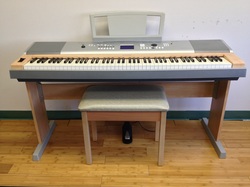 The Yamaha DGX-640 The newest release of the DGX series (also known as YPG) is the DGX-640. These models look alike from the DGX-620 through the DGX-640, and there have been minor improvements along the way, though the most notable would be moving from 32 note polyphony in the 620 to 64 note polyphony in the 640. Higher polyphony, which is simply the number of notes that can be sustained at one time, becomes more important as the student progresses and plays more complicated passages where there is risk of sustained notes “falling off”. The newer DGX series also has the option of adding a three pedal board instead of a single free standing pedal. As far as the touch and feel, Yamaha is one of the best at quality hammer action and great stereo sampled grand piano sounds. Finally, there are a number of features and gadgets that the other pianos don’t have. The ability to layer multiple tracks for one, is something that a composer would want. The appearance is a bit keyboardy, but this digital piano is often the choice of universities and music lessons studios as the preferred practice model because of it’s durability 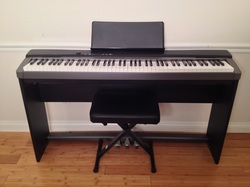 The Casio Privia PX-130 This piano has been the feather in the cap for Casio and this model is one of our most popular rental pianos. It boasts a sleek elegant black case with silver pedals (optional) and offers great sounds, touch and 128 note polyphony, which is more than anyone would ever need. Based on appearances, this would be the best choice of the three models reviewed in this article. The PX-130 is a major redesign from the previous models, the PX-120, PX-110, and PX-100. Casio cleverly uses the keys as feature controls rather than a litany of buttons. There is question as to how this piano will hold up in 5-10 years compared to the others. Casio pianos tend to get a bit of a plasticky touch to the keys when they get older, more so than the Yamahas. 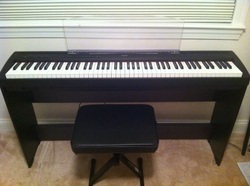 Yamaha P95S Like the PX-130, the Yamaha P95S is a sleek, good looking digital piano that is great for beginners. If you like the touch of a Yamaha, then you will want to select this over the Privia, and if you just want piano features without a bunch of extra gadgets, then you will want to choose this over the DGX series. The max polyphony is 64 notes at one time, which is more than adequate for the beginner. I would have liked to see a solid colored music rest rather than the clear plastic one, but this is just my personal preference. The optional three pedal board has plastic pedals which don’t look as nice as the Privia’s pedals, but they work well and seem more durable.. I’d have to give a slight edge to the graded hammer touch of the P95S over the Privia. The shell of the piano also seems more durable. In the world of beginner pianos, there are so many models to choose from. We think these three are the best and they are certainly our most requested models. I’m happy to answer any questions about these or other models if you’d like to email me at [email protected] Should you buy a Piano or Digital Piano? I will give you a high level overview of what to consider when making this decision. Usually people make this decision based on their budget, living arrangements, commitment/level of proficiency or some combination of all of these factors. This will be a three part blog focusing on each of these factors. This post will focus on the budget aspect.
Generally speaking, a digital piano is a less expensive option than an acoustic upright or grand piano, though you will often see free upright pianos being given away on craigslist. I would stay away from those unless you know what you are doing. They can easily be a bigger project than you might think when you consider moving expenses, tuning (can it even hold a pitch), brand, quality, etc. There are many digital pianos, however, that are more expensive than an acoustic piano, but for the purposes of this blog, I will use basic uprights and basic fully weighted 88-key digitals as the benchmarks. Whichever you end up buying, I would suggest that you stick to a well known brand so that if you do need to sell in the future, your piano will experience less depreciation. If acoustic, Yamaha and Kawai hold their value the best. Yes you will spend more, but 30 years from now, people will still want that piano. Lesser known brands will be give-a-ways at that age. Always buy a black piano. Brown ones do not hold their value like black ones do. The majority of people shopping are looking for a black piano because it goes with everything. If you are buying a digital piano, again, I would stick with the best brands. Yamaha Clavinova or YDP series, Roland, Kawai, and believe it or not, Casio has come up with a fantastic digital piano line with the Privia. There are so many brands like Williams, Suzuki and others that will fall apart quickly. Color is less important with digital pianos, but typically dark brown or black are the most desired. If buying a used digital piano for sale, test the keys and make sure they all have an even consistent sound and feel. Listen for “press and release” noise. This should be very quiet so it is not distracting to the player. Make sure the pedals work. Turn it off and on again to make sure the electronics are working properly. Age is important, but anything post 1998 should be adequate because by then, almost all electronic pianos made the change from analog sounds to sampled grand piano sounds, and there has been somewhat of a plateau since then. Renting a digital piano for a beginner is not a bad idea to save money if the player loses interest, or if they have a high level of interest, you may want to purchase an acoustic piano or more advanced digital piano. Piano rental allows you to defer that decision to a later date. If buying a used acoustic piano, check the age by serial number if you can find a source. Yamaha and Kawai post their serial numbers online so you can tell the age. Don’t be afraid of age if the piano is well maintained or rebuilt, particularly if it is a Yamaha or Kawai. Watch for “grey market” pianos. While there is nothing specifically wrong with these pianos, they were not built for the American market, so may have less value when you go to sell. Do not take on a free piano project unless you know what you are doing. I am happy to answer specific questions about models and prices. Just contact us at [email protected] Singing Strings rents and leases pianos and digital pianos to Northern Virginia, Washington DC, and Maryland, including Baltimore. 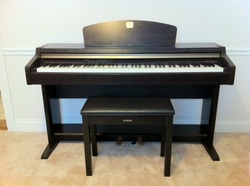 Do you hear a knocking noise or clicking noise when you release the keys on your Clavinova piano? Are you having trouble coming up with a word to describe the sound? You are not alone. Many Clavinova's develop this problem after a few years, and it continues to get worse unless addressed. Why does it do this? inside frame of the digital piano, there are pins that effectively counter weights so that when you press down on the keys, you get the sense that you are pushing real piano keys down, and when you release the key, the counterweight falls back to its original position. Underneath the counterweight is a long stopper pad, or what I call a felt strip, that deadens the sound when the keys are released. Over time through use, and just simple gravity when not used, this felt strip begins to flatten and the effectiveness of the sound deadening begins to fail. How Do I fix it? There are a couple ways to fix this issue. The recommended way is to take it to the shop and get them to replace the lower stopper pad, which could be expensive depending on your options for keyboard repair shops. They will take it apart, order the parts, and it will feel and sound much like a new keyboard when you get it back. The do it yourself way, which I have seen done - sometimes well and sometimes disastrously, is to use thin weatherstripping under the counterweights. To do this, you would need to buy the thinnest 1/4 inch self adhesive weather stripping and cut it into small pieces to stick on the felt under the keys. If you try to stick them to the side, then over time, they will get pushed down,and the self adhesive will begin to stick to the counterweights and you will have a new problem. Feel free to contact me for additional support on this issue or contact us if you are in the DC Area and need a repair by visiting http://www.pianorentaldc.com/clavinova-repairs.html We are often asked, "How do we get our kids to practice their instruments more often?" Here are some suggestions to help increase their interest and keep them motivated:
1. Take your kids to concerts and performances We believe that the more you expose your kids to live music, and the more they get a chance to listen to good performers, the more they become interested and motivated to practice. 2. Have them listen to music listening to music helps your child gain a much better ear for music, and they become more responsive to sounds. Active listening also helps them with intonation if they play a stringed instrument. 3. Subscribe to music related magazines Reading and staying up to date on events in the music world will deepen their interest and commitment to their instrument. Sometimes a small investment like this will pay off long term. 4. Get to know your child's teacher We believe that the parent-teacher relationship is extremely important in understanding the progress of your child's musical education. Remember that it is going to be a team effort, and since they likely only meet the teacher once per week, it is important that they practice what they've learned the rest of the days 5. Enroll them in recitals. Enrolling your child in recitals gives them something to work toward, and keeps them motivated to practice since they will be performing in front of an audience. Please feel free to contact us if you have questions about this or other topics How do you stay motivated playing the piano and break through some plateaus? We will share some standard and some less common ways to get some extra mileage out of your practices.
1. Push harder on the keys Somehow when you push harder when learning something new, you are making a deeper imprint in your mind and finger memory when you do this. When you strike the keys with more confidence and authority, it stays with you when you play these passages in the future. 2. Repeat, repeat, repeat When you find yourself playing a difficult passage, break it into smaller phrases, and play them over and over again in a short period of time. It can be mind numbing, but your fingers have memory, and they will thank you for this later 3. Use your iphone or kitchen timer This especially comes in handy when you have a child who keeps asking, "am I done yet?" Doing this gives a definite start and finish time for practice and creates good habits. 4. Say the notes as you play them This is a best practice for beginners who are learning to read music. The reinforcement will make learning to read music happen faster. You can also sing the notes as some of our senior students like to do. 5. Switch to different tones or to a digital piano Sometimes it is nice to step away from the acoustic piano and play on a digital piano if you have one. You can gain some new energy by doing this. You can get more mileage by practicing the same scales, songs and finger exercises on all of the different tones of the digital piano. This can easily buy you an extra 10-20 minutes of practice. 6. Reward yourself This final strategy goes a long way in making strong connections with what you are playing. Simply keep your favorite beverage (non-alcoholic, of course) with you while you are learning something new. As you accomplish something challenging, take a small sip. Wait to take another when you make an improvement or manage a difficult passage or chord. There is something hard wired in our brains that responds to this type of reward system as simple as it may seem. Notice the way you feel as you take a sip and reflect on your accomplishment. We hope this helps you make some extra leaps or break through some plateaus that you may experience when practicing the piano. Feel free to contact us with questions about Piano Lessons in Gaithersburg, MD or Digital Piano Rentals Often times people will take music lessons or take their kids to a music instructor without putting much thought into how well that teacher appeals to the student's strengths. Most teachers only teach one way and do not adapt well to students who may have different learning styles. If this is the case, you really have only two options, other than muddling along with an inadequate teacher: Help your instructor understand what works for you, or find another instructor.
The best teachers will teach you how to teach yourself. Some examples of a teacher that you may want to avoid would be one who is inflexible, who insists the you play songs you don't like, or is impatient with your mistakes or bad habits. A good teacher is positive, flexible, and willing to seek out pieces that suit the students technique and taste. Also, the ability to communicate and relate to the student is paramount to quality skill development. If you feel that you are not making progress, or you feel that you are less interested in the lessons than you expected to be, it may be the teacher, and not you. In a down economy, you may be looking for ways to shave costs, especially large ticket purchases like a piano or digital piano. Renting a piano or digital piano can be a good idea in some cases, while it is a much better plan to purchase in others. We will take a look at some circumstances for both.
Renting makes the most sense if you have a child who you are not sure how interested that they will be in playing the piano after six months of lessons. If they stay interested, then it is clearly a better move to purchase at that point. We usually recommend going with a good upright or baby grand if your child shows sustained interest. Many people do not know that they can rent a digital piano, but this is a very good option for college students, people who are in the country temporarily, or those who are hesitant to make a large scale purchase until they know they won't be moving for a while. Renting also buys you time to make an informed purchase while your child's skills continue to bloom. We recommend Yamaha, Kawai, or Samick as a good brand to take you or your child to the next level. Keywords Piano Rental, Digital Piano Rental, Keyboard Rental Parents are often eager to introduce their children to music early on because of all of the benefits that learning an instrument offers, but how young is too young to start? You probably guessed the answer: It depends on the child. Generally, we don't recommend starting one-on-one lessons before the age of five but we do see value in group lessons for children as young as two years old with the participation of the parent. During these group lessons, there is typically dancing, singing, learning about various instruments. Clapping and counting is also introduced as a way of exposing children to rhythm and time. These classes will also help keep the child interested in music because they are fun and engaging.
As the child approaches the age of five, it will be time to select an instrument and begin one-on-one lessons which we will discuss in an upcoming blog post. If you have questions about group lessons in or near Gaithersburg, MD, please feel free to reach out to us. |
About UsSinging Strings Music Center is located in Archives
January 2013
Categories
All
|
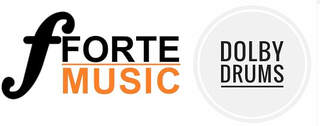
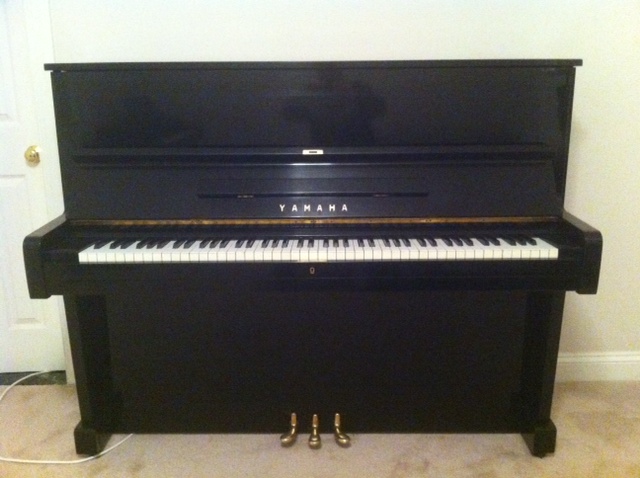
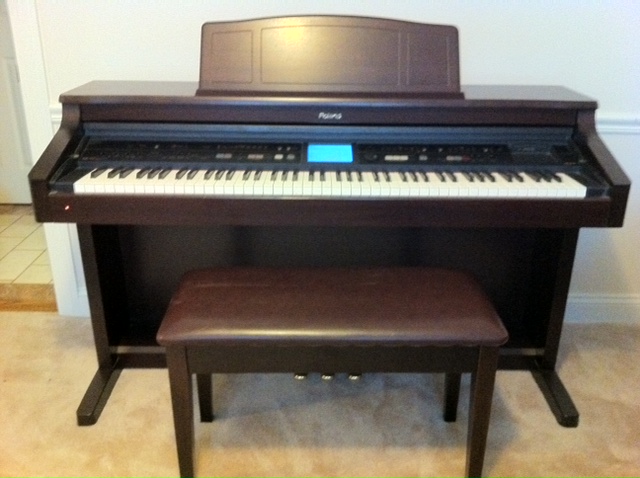
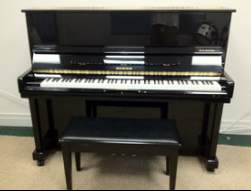
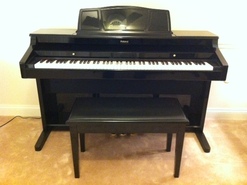
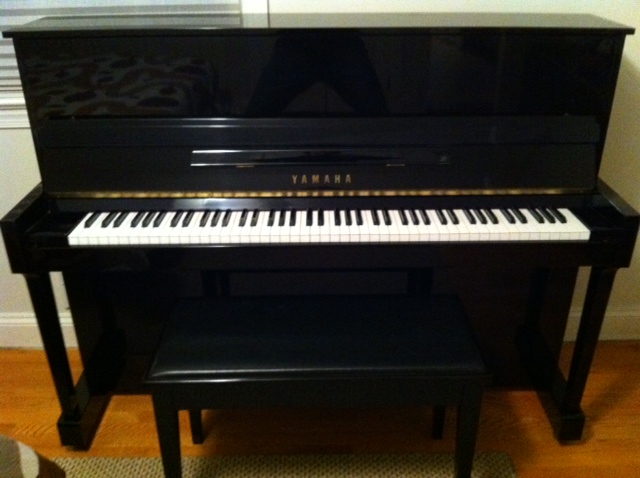
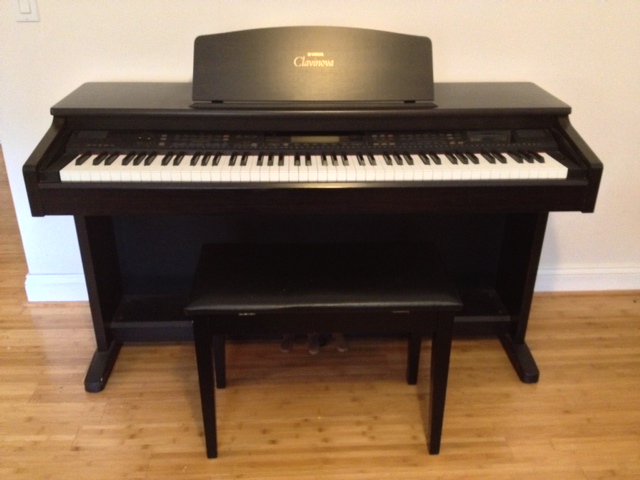
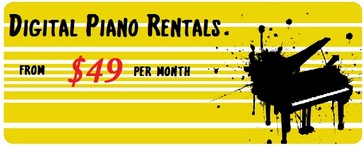
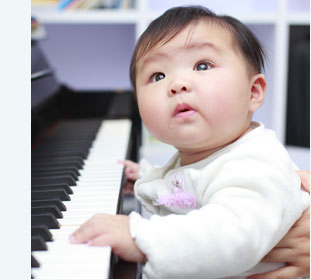
 RSS Feed
RSS Feed